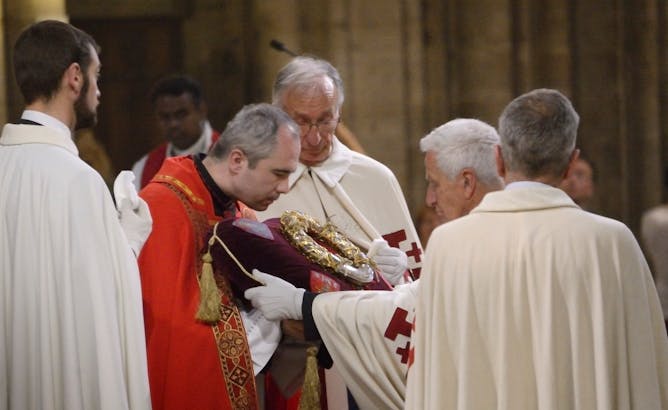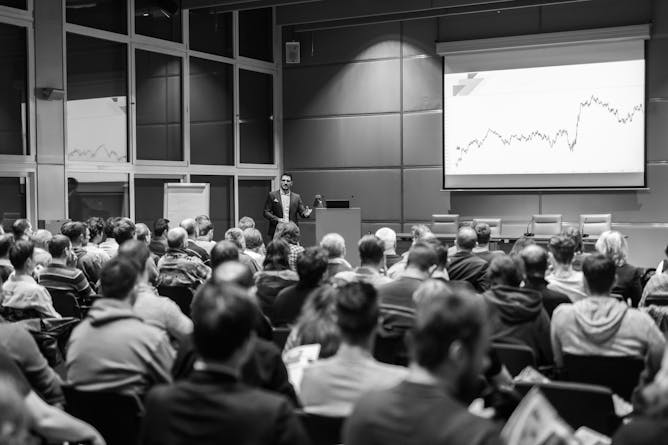|
|
|
Editor's note
|
|
Activists brought some of the busiest parts of London to a grinding halt this week as part of a massive protest against climate change. One of Extinction Rebellion’s rallying cries has been to heed the apparent warnings from the Intergovernmental Panel on Climate Change (IPCC) that we only have 12 years to prevent catastrophe. But one of the IPCC’s scientific authors is now speaking out against this claim.
Myles Allen positively encourages these protesters to get angry, but appeals to them to get angry “for the right reasons”. He is concerned that the “12 years” line isn’t an accurate reflection of what the panel says will happen in 2030, which surely can’t help their cause.
The events of this week have raised some really interesting questions about cultural history, human emotion and values. Notre Dame is a site of Catholic ritual but seeing the building in flames left many of us feeling shocked, whether we are believers or not. And in fact, the interplay between the religious and the secular runs deep in the building’s fascinating history.
A court will soon rule on whether South African athlete Caster Semenya can compete as a woman without artificially reducing her testosterone levels. This case has been controversial for years and the ruling isn’t likely to end that. It has major implications for sport and, indeed, the way we think about gender.
This week we’ve also been helping readers assess whether they could catch measles, as well as if they’ll ever have a robot as a teacher.
|
Laura Hood
Politics Editor, Assistant Editor
|

|
|
|
|

John Stillwell/PA
Myles Allen, University of Oxford
I helped write the IPCC 1.5°C report the number apparently comes from. But the truth is better – and worse – than that.
|

Holy Crown of Thorns worn by Jesus Christ is presented for in a special service at Notre Dame Cathedral, June 2017.
Damann via Shutterstock
Dr Emily Guerry, University of Kent
One of the most sacred relics in the Christian world was saved from the Notre Dame fire. Here is its history.
|

Caster Semenya leads the women’s 800 metres at the Rio 2016 Olympics.
CP DC Press/Shutterstock
Sheree Bekker, University of Bath
Arbitration case between athlete Caster Semenya and the IAAF centres on eligibility to compete based on testosterone – but there are other factors in play.
|

Matej Kastelic/Shutterstock.com
Joris Tieleman, Erasmus University Rotterdam
In economics classes, relentless growth is an unquestioned dogma. Yet this same economic growth is rapidly ripping apart the ecological foundations of our world.
|

Where to land?
DanieleGay/Shutterstock
Jonathan Aitken, University of Sheffield
Putting driverless cars on the road safely is hard enough. Doing it in the air is much more difficult.
|
|
|
-
Michael Rapport, University of Glasgow
From coronations to Revolution to reconciliation, Notre Dame has witnessed nearly 900 years of French history.
-
Christopher Manser, University of Warwick
By studying old and dead stars, we can discover what will happen to our sun in the far, far future. And it won't end with a big explosion.
-
Indrajit Roy, University of York; Annabel Bligh, The Conversation
The second part of this series from The Anthill podcast looks at the trajectories of Hindu nationalism in India.
-
Alessia Grassi, University of Huddersfield
Prada and Louis Vuitton are just two major brand names to make a big play in the art world. But if you are looking for innovation you may be disappointed.
-
Nisreen Ameen, Queen Mary University of London
Conducting research and contributing to knowledge creation might be the only way for academics to sustain their jobs.
-
Eyal Amiel, University of Vermont
The growing number of cases of measles has many people asking: Am I safe? A vaccine expert provides some answers.
-
Lori Wilkinson, University of Manitoba
A celebration for the Winnipeg Jets turned controversial when an anti-racist group challenged a "make Winnipeg white again" headline about the city's NHL playoff "whiteout" parties.
|
|
| |
Featured events
|

|
Museum of English Rural Life, Redlands Road,, Reading, Reading, RG1 5EX, United Kingdom — University of Reading
|

|
The University of Manchester, Oxford Road, Manchester, Manchester, M13 9PL, United Kingdom — University of Manchester
|

|
Museum of English Rural Life, Redlands Road,, Reading, Reading, RG1 5EX, United Kingdom — University of Reading
|

|
Gustave Tuck Lecture Theatre, Wilkins Building, Gower Street, London, London, City of, WC1E 6BT, United Kingdom — UCL
|
|
|
|
| |
| |
| |
| |
| |
|
|
|
|
|
|
|